简明实用英语 (第一册)共55页文档
实用英语第一册第八单元课件

They boasted that they can speak six languages fluently. He didn’t talk about the results of his exam in case people thought he was boasting.
2.
pile:
Split sth. Up: to divide sth. Into smaller parts
The course was split up into 8 periods.
text
used to: 这是个半情态助动词(semimodal verb),“used to + 动词原形”指 过去常常做什么,而现在已经不常这样做了。
Remain vi./n.
N. the parts of sth. That are left after the rest has been destroyed or has disappeared 残余;遗迹 E.g. on the table were the remains of the evening meal.
idle away: to spend time in idleness 虚度(光阴),浪费(时间) e.g. (1) He idled away the whole morning in his room. 他在房间里混了整整一个上午。 (2) Don’t idle away your time. 别浪费你的时间。
n. [C] 一堆,一叠 e.g. (1) We’ve had piles of letters from viewers. 我们收到了大量的观众来信。 (2) The ancient palace became a pile of ruins after the earthquake. 地震后这座古代宫殿变成了一片废墟。 V. to put things one on top of another(把……)堆积 e.g. (1) She piled the books one on top of the other. 她把书一本本地摞起来。 (2) The sofa was piled high with cushions. 沙发上高高地堆着一些垫子。 a pile of: a lot of something 一大堆,大量 e.g. I’ve got a pile of work to do this evening. 今晚我有一大堆事情要做。
实用英语英语第一册

14
♦ considering prep. 鉴于,考虑到 鉴于,
Considering his poor health, I’m afraid he is unable to undertake the heavy task. ♦ considerate a. 体贴的,替人着想的 体贴的, It is said that Mary is a considerate girl. ♦ considered a. 深思熟虑的 Three days later he made a considered decision. ♦ considerable a. 相当大的,相当多的 相当大的, His hard work earned him a considerable amount of money.
6
♦ -ence/-ance:
confident --- confidence (信心 信心) 信心 depend --- dependence --- independence The nation gained ____ only five years ago. (depend) independence Have ____ in yourself, and you’ll be more likely to win the contest. (confident) confidence
13
♦feasible adj. 可行的 Can you think of a feasible plan to settle the problem? 你能想出一个可行的计划来解决这个问 题吗? 题吗? ♦latter adj. 后面的,后者的 后面的, Both Tom and Bob are leaving. The former is going to Beijing and the latter is returning to his hometown.
实用英语综合教程第一册6单元翻译
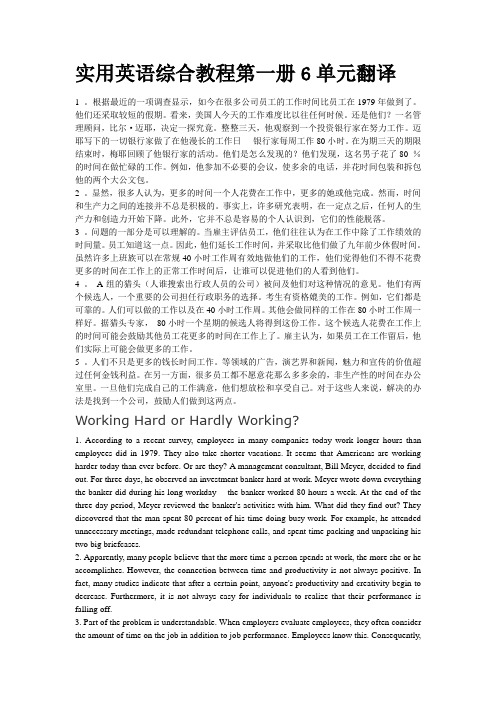
实用英语综合教程第一册6单元翻译1 。
根据最近的一项调查显示,如今在很多公司员工的工作时间比员工在1979年做到了。
他们还采取较短的假期。
看来,美国人今天的工作难度比以往任何时候。
还是他们?一名管理顾问,比尔·迈耶,决定一探究竟。
整整三天,他观察到一个投资银行家在努力工作。
迈耶写下的一切银行家做了在他漫长的工作日- 银行家每周工作80小时。
在为期三天的期限结束时,梅耶回顾了他银行家的活动。
他们是怎么发现的?他们发现,这名男子花了80 %的时间在做忙碌的工作。
例如,他参加不必要的会议,使多余的电话,并花时间包装和拆包他的两个大公文包。
2 。
显然,很多人认为,更多的时间一个人花费在工作中,更多的她或他完成。
然而,时间和生产力之间的连接并不总是积极的。
事实上,许多研究表明,在一定点之后,任何人的生产力和创造力开始下降。
此外,它并不总是容易的个人认识到,它们的性能脱落。
3 。
问题的一部分是可以理解的。
当雇主评估员工,他们往往认为在工作中除了工作绩效的时间量。
员工知道这一点。
因此,他们延长工作时间,并采取比他们做了九年前少休假时间。
虽然许多上班族可以在常规40小时工作周有效地做他们的工作,他们觉得他们不得不花费更多的时间在工作上的正常工作时间后,让谁可以促进他们的人看到他们。
4 。
A组的猎头(人谁搜索出行政人员的公司)被问及他们对这种情况的意见。
他们有两个候选人,一个重要的公司担任行政职务的选择。
考生有资格媲美的工作。
例如,它们都是可靠的。
人们可以做的工作以及在40小时工作周。
其他会做同样的工作在80小时工作周一样好。
据猎头专家,80小时一个星期的候选人将得到这份工作。
这个候选人花费在工作上的时间可能会鼓励其他员工花更多的时间在工作上了。
雇主认为,如果员工在工作留后,他们实际上可能会做更多的工作。
5 。
人们不只是更多的钱长时间工作。
等领域的广告,演艺界和新闻,魅力和宣传的价值超过任何金钱利益。
在另一方面,很多员工都不愿意花那么多多余的,非生产性的时间在办公室里。
实用英语第一册教案.doc
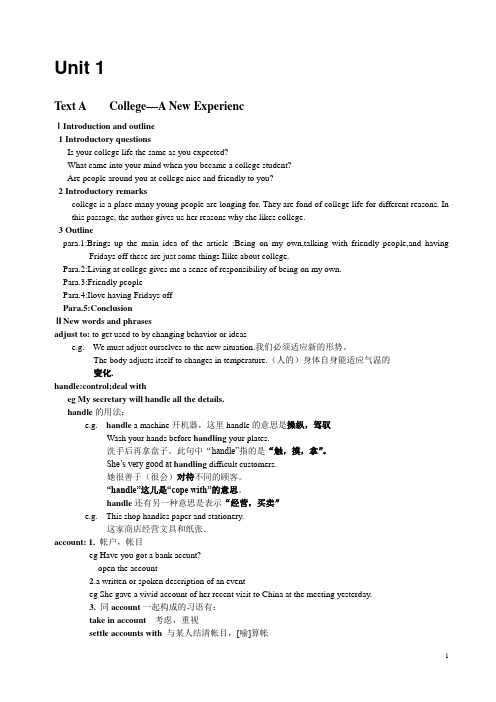
Unit 1Text A College—A New ExperiencⅠIntroduction and outline1 Introductory questionsIs your college life the same as you expected?What came into your mind when you became a college student?Are people around you at college nice and friendly to you?2 Introductory remarkscollege is a place many young people are longing for. They are fond of college life for different reasons. In this passage, the author gives us her reasons why she likes college.3 Outlinepara.1:Brings up the main idea of the article :Being on my own,talking with friendly people,and having Fridays off these are just some things Ilike about college.Para.2:Living at college gives me a sense of responsibility of being on my own.Para.3:Friendly peoplePara.4:Ilove having Fridays offPara.5:ConclusionⅡNew words and phrasesadjust to: to get used to by changing behavior or idease.g. We must adjust ourselves to the new situation.我们必须适应新的形势。
实用英语1册教案
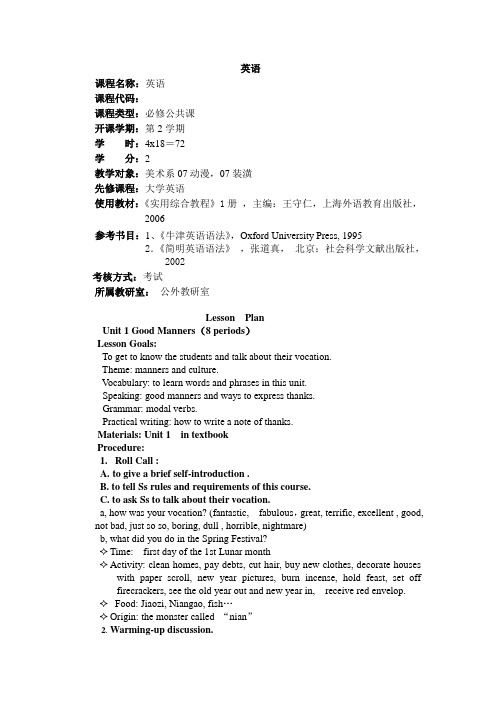
英语课程名称:英语课程代码:课程类型:必修公共课开课学期:第2学期学时:4x18=72学分:2教学对象:美术系07动漫,07装潢先修课程:大学英语使用教材:《实用综合教程》1册,主编:王守仁,上海外语教育出版社,2006参考书目:1、《牛津英语语法》,Oxford University Press, 19952.《简明英语语法》,张道真,北京:社会科学文献出版社,2002考核方式:考试所属教研室:公外教研室Lesson PlanUnit 1 Good Manners(8 periods)Lesson Goals:To get to know the students and talk about their vocation.Theme: manners and culture.V ocabulary: to learn words and phrases in this unit.Speaking: good manners and ways to express thanks.Grammar: modal verbs.Practical writing: how to write a note of thanks.Materials: Unit 1 in textbookProcedure:1.Roll Call :A.to give a brief self-introduction .B. to tell Ss rules and requirements of this course.C. to ask Ss to talk about their vocation.a, how was your vocation? (fantastic, fabulous,great, terrific, excellent , good, not bad, just so so, boring, dull , horrible, nightmare)b, what did you do in the Spring Festival?✧Time: first day of the 1st Lunar month✧Activity: clean homes, pay debts, cut hair, buy new clothes, decorate houseswith paper scroll, new year pictures, burn incense, hold feast, set off firecrackers, see the old year out and new year in, receive red envelop.✧Food: Jiaozi, Niangao, fish…✧Origin: the monster called “nian”2. W arming-up discussion.A Can you name anything related with "manners"?Greetings, polite, shake hands, avoid certain topics , courtesy, patient ...B What kind of behavior do you think is good manners for a man?a.He should help her get in and out of cars. ( )b.He should pay the dinner everytime. ( )c.He should walk on the outside of a woman on the sidewalk.( )d.He should pull the chair out for her before sitting down himself. ( )e.He should never resort to violent means. ( )3. Study of words and expressions in the Text A.A Help Ss read the words.B Study of words and expressions in the Text A.a.Underline the new words and phrases in text and try to understand itsmeaning.b.K ey words and expressions.C Vocabulary check (B and C)4. Discussion of Text A and the following-up exercises..A. Ss watch the video clip and answer questions.B. T helps Ss understand the text and difficult sentences.C. Ss finish the following-up exercises5. 7. Grammar tips: modal verbs.A.T asks Ss to tell the types of modal verbs in their own words.B.T gives Ss some examples and helps Ss get rules about it.C. Ss finish exercises.6. Discussion of Text B and the following-up exercises.A. Warming up: T asks Ss to answer Comprehensive questions.B. Study of words and expressions in the Text B.C. Detailed study of the text.D. Ss finish the following-up exercises .prehensive exercises.8. Homework: write a note of thanks.Unit2 Living Environment(8periods)Lesson Goals:Theme:enviromental protection.V ocabulary: to learn words and phrases in this unit.Speaking: how to make our living enviroment beautiful and comfortable. Grammar:the adverbial clause of time.Practical writing: how to write a note of apology.Materials: Unit 2 in textbookProcedure:1. Roll Call :2. W arming-up discussion.A. Can you name anything related with "enviroment"?Chemical, waste, pollution, population...B. Disscussion: how to make our living enviroment beautiful and comfortable.3. Study of words and expressions in the Text A.A. Help Ss read the words.B. Study of words and expressions in the Text A.a.Underline the new words and phrases in text and try to understand itsmeaning.b.K ey words and expressions.C. V ocabulary check (B and C)4. Discussion of Text A and the following-up exercises..A. Ss watch the video clip and answer questions.B. T helps Ss understand the text and difficult sentences.C. Ss finish the following-up exercises5. Grammar tips: the adverbial clause of time .A. T asks Ss to tell the types of time expressions in their own words.B. T gives Ss some examples and helps Ss get rules about it.C. Ss finish exercises.6. Discussion of Text B and the following-up exercises.A. Warming up: T asks Ss to answer Comprehensive questions.B. Study of words and expressions in the Text B.C. Detailed study of the text.D. Ss finish the following-up exercises .prehensive exercises.8. Homework: write a note of apology.Unit3 Fast Food(8periods)Lesson Goals:Theme:healthy eating habits.V ocabulary: to learn words and phrases in this unit.Speaking: western and Chinese foods and drinks.Grammar:the adverbial clause of purpose.Practical writing: how to write a note of congratulation.Materials: Unit 3 in textbookProcedure:1. Roll Call :2. W arming-up discussion.A. Can you name anything related with "food"?Diet, health, habit, flour, fruit...B. Disscussion: differences between western and Chinese foods and drinks.3. Study of words and expressions in the Text A.A. Help Ss read the words.B. Study of words and expressions in the Text A.a.Underline the new words and phrases in text and try to understand itsmeaning.b.K ey words and expressions.C. V ocabulary check (B and C)4. Discussion of Text A and the following-up exercises..A. Ss watch the video clip and answer questions.B. T helps Ss understand the text and difficult sentences.C. Ss finish the following-up exercises5. Grammar tips: the adverbial clause of purpose .A. T asks Ss to tell the types of adverbial clauses in their own words.B. T gives Ss some examples and helps Ss get rules about it.C. Ss finish exercises.6. Discussion of Text B and the following-up exercises.A. Warming up: T asks Ss to answer Comprehensive questions.B. Study of words and expressions in the Text B.C. Detailed study of the text.D. Ss finish the following-up exercises .prehensive exercises.8. Homework: write a note of apology.Unit 4 Daily shopping(8periods)Lesson Goals:Theme:shopping.V ocabulary: to learn words and phrases in this unit.Speaking: shopping experienceGrammar:the gerund.Practical writing: how to write an anouncement.Materials: Unit 4 in textbookProcedure:1. Roll Call :2. W arming-up discussion.A. Can you name anything related with "shopping"?Customer, queue, check, account, grocery...B. Disscussion: do you have any impressive shoping experience?3. Study of words and expressions in the Text A.A. Help Ss read the words.B. Study of words and expressions in the Text A.a. Underline the new words and phrases in text and try to understand its meaning.b. Key words and expressions.C. V ocabulary check (B and C)4. Discussion of Text A and the following-up exercises..A. Ss watch the video clip and answer questions.B. T helps Ss understand the text and difficult sentences.C. Ss finish the following-up exercises5. Grammar tips: the gerund.A. T asks Ss to tell the feature of the gerund in their own words.B. T gives Ss some examples and helps Ss get rules about it.C. Ss finish exercises.6. Discussion of Text B and the following-up exercises.A. Warming up: T asks Ss to answer Comprehensive questions.B. Study of words and expressions in the Text B.C. Detailed study of the text.D. Ss finish the following-up exercises .prehensive exercises.8. Homework: write a note of apology.Unit 5 Modern Communication(8periods)Lesson Goals:Theme:communication.V ocabulary: to learn words and phrases in this unit.Speaking: benefits and disadvantages of modern communication. Grammar:the infinitive.Practical writing: how to write a notice.Materials: Unit 5 in textbookProcedure:1. Roll Call :2. W arming-up discussion.A. Can you name anything related with "communication"?Hotline, caller, cellphone, telegram, language...B. Disscussion: what're the effecient ways of communication ?3. Study of words and expressions in the Text A.A. Help Ss read the words.B. Study of words and expressions in the Text A.a. Underline the new words and phrases in text and try to understand its meaning.b. Key words and expressions.C. V ocabulary check (B and C)4. Discussion of Text A and the following-up exercises..A. Ss watch the video clip and answer questions.B. T helps Ss understand the text and difficult sentences.C. Ss finish the following-up exercises5. Grammar tips: the infinitive.A. T asks Ss to tell the roles of the infinitive in their own words.B. T gives Ss some examples and helps Ss get rules about it.C. Ss finish exercises.6. Discussion of Text B and the following-up exercises.A. Warming up: T asks Ss to answer Comprehensive questions.B. Study of words and expressions in the Text B.C. Detailed study of the text.D. Ss finish the following-up exercises .prehensive exercises.8. Homework: write a note of notice.Unit 6 Health Care(8periods)Lesson Goals:Theme:health.V ocabulary: to learn words and phrases in this unit.Speaking: How to describe your illness to your doctor?Grammar:the past participle .Practical writing: how to write a name card.Materials: Unit 6 in textbookProcedure:1. Roll Call :2. W arming-up discussion.A. Can you name anything related with "health"?Symptom, liver, cold, fever...B. Disscussion: what do you usually do to maintain healthy?3. Study of words and expressions in the Text A.A. Help Ss read the words.B. Study of words and expressions in the Text A.a. Underline the new words and phrases in text and try to understand its meaning.b. Key words and expressions.C. V ocabulary check (B and C)4. Discussion of Text A and the following-up exercises..A. Ss watch the video clip and answer questions.B. T helps Ss understand the text and difficult sentences.C. Ss finish the following-up exercises5. Grammar tips: the past participle.A. T asks Ss to tell the functions of past participles in their own words.B. T gives Ss some examples and helps Ss get rules about it.C. Ss finish exercises.6. Discussion of Text B and the following-up exercises.A. Warming up: T asks Ss to answer Comprehensive questions.B. Study of words and expressions in the Text B.C. Detailed study of the text.D. Ss finish the following-up exercises .prehensive exercises.8. Homework: write a name card.Unit 7 Generation Gap(8periods)Lesson Goals:Theme:generation gap.V ocabulary: to learn words and phrases in this unit.Speaking: the relationship between you and your parents?Grammar:the relative clause .Practical writing: how to write an invitation letter.Materials: Unit 7 in textbookProcedure:1. Roll Call :2. W arming-up discussion.A. Can you name anything related with "generation gap"?Parent, age, idea, old-fashioned, popular, value...B. Disscussion: how to bridge the generation gap?3. Study of words and expressions in the Text A.A. Help Ss read the words.B. Study of words and expressions in the Text A.a. Underline the new words and phrases in text and try to understand its meaning.b. Key words and expressions.C. V ocabulary check (B and C)4. Discussion of Text A and the following-up exercises..A. Ss watch the video clip and answer questions.B. T helps Ss understand the text and difficult sentences.C. Ss finish the following-up exercises5. Grammar tips: the relative clause.A. T asks Ss to tell the types of the relative clauses in their own words.B. T gives Ss some examples and helps Ss get rules about it.C. Ss finish exercises.6. Discussion of Text B and the following-up exercises.A. Warming up: T asks Ss to answer Comprehensive questions.B. Study of words and expressions in the Text B.C. Detailed study of the text.D. Ss finish the following-up exercises .prehensive exercises.8. Homework: write an invitation letter.Unit 8 Gender Differences(8periods)Lesson Goals:Theme:gender differences.V ocabulary: to learn words and phrases in this unit.Speaking: gender differences in some ways.Grammar:the predicative clause.Practical writing: how to write letters either to accept or decline an invitation. Materials: Unit 8 in textbookProcedure:1. Roll Call :2. W arming-up discussion.A. Can you name anything related with "gender"?Male, female, strength, equal ...B. Disscussion: are there any gender differences nowadays? What are they?3. Study of words and expressions in the Text A.A. Help Ss read the words.B. Study of words and expressions in the Text A.a. Underline the new words and phrases in text and try to understand its meaning.b. Key words and expressions.C. V ocabulary check (B and C)4. Discussion of Text A and the following-up exercises..A. Ss watch the video clip and answer questions.B. T helps Ss understand the text and difficult sentences.C. Ss finish the following-up exercises5. Grammar tips: the predicative.A. T asks Ss to tell the types of the predicative in their own words.B. T gives Ss some examples and helps Ss get rules about it.C. Ss finish exercises.6. Discussion of Text B and the following-up exercises.A. Warming up: T asks Ss to answer Comprehensive questions.B. Study of words and expressions in the Text B.C. Detailed study of the text.D. Ss finish the following-up exercises .prehensive exercises.8. Homework: write letters either to accept or decline an invitation.Unit 9 Job Hunting(8periods)Lesson Goals:Theme:job hunting in a city.V ocabulary: to learn words and phrases in this unit.Speaking: how to communicate with a potential employer in an interview. Grammar:the object clause.Practical writing: how to write a resume.Materials: Unit 9 in textbookProcedure:1. Roll Call :2. W arming-up discussion.A. Can you name anything related with "job"?Empolyer, employee, personnel, resume, applicant...B. Disscussion:what problems may come up in a job interview.3. Study of words and expressions in the Text A.A. Help Ss read the words.B. Study of words and expressions in the Text A.a. Underline the new words and phrases in text and try to understand itsmeaning.b. Key words and expressions.C. V ocabulary check (B and C)4. Discussion of Text A and the following-up exercises..A. Ss watch the video clip and answer questions.B. T helps Ss understand the text and difficult sentences.C. Ss finish the following-up exercises5. Grammar tips: the object clause.A. T asks Ss to tell the types of object clauses in their own words.B. T gives Ss some examples and helps Ss get rules about it.C. Ss finish exercises.6. Discussion of Text B and the following-up exercises.A. Warming up: T asks Ss to answer Comprehensive questions.B. Study of words and expressions in the Text B.C. Detailed study of the text.D. Ss finish the following-up exercises .prehensive exercises.8. Homework: write a resume.。
最新-实用英语综合教程第一册第一单元-PPT文档资料
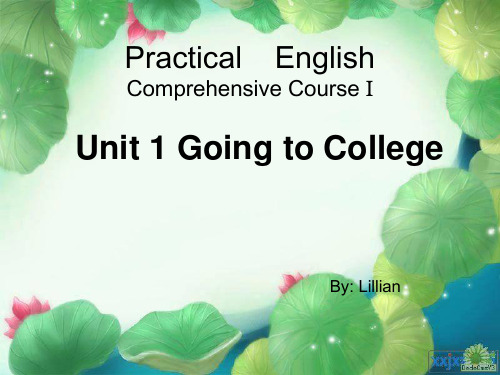
How to find the main idea of the whole passage?
• First paragraph • Last paragraph • Topic sentences • High-frequency words
Detailed reading
• Find out the topic sentence of each paragraph.
Practical English
Comprehensive Course I
Unit 1 Going to College
By: Lillian
Tasks of Text A
• Related information • Pre-reading task • Skimming: to get the general idea • Detailed reading: topic sentences and
love having Fridays off.
Language points
I’m away from home, so I have many things to adjust to.
• adjust to: to get used to by changing behavior or ideas
• Underline the new language points.
Topic sentences
• The topic sentence of para.1 College is a new and different experience for
me. • The topic sentence of para.2 Living at college, first of all, gives me a
实用英语第一册第一单元课件

new words
Para. 2
Capacity n. ability, power 能力;容量,容积 e.g.
(1)He has a great capacity for remembering. (2)The theatre has a seating capacity of 2000.
Incapacity n. lack of ability or power to do sth. e.g. He was fired for his incapacity for hard work.
approve
disapprove: v. (of)
to have an unfavorable opinion 不赞成, 不同意 e.g.
(1) He disapproves of women smoking. (2) They disapproved strongly of my proposal.
Translation
因为哭是人体的一种自然技能,是为了让感情失衡 的人恢复到平衡状态。
translation
Para. 2
The return of the unbalanced organ systems of the body to steady or dynamic stability is known as homeostasis.
new words
Para. 1
in the least: (usu. in negative) at all 一点,丝毫,极少
e.g.
(1)He is not in the least worried. (2)He was not in the least surprised.
实用英语第一册第三单元课件Unit3
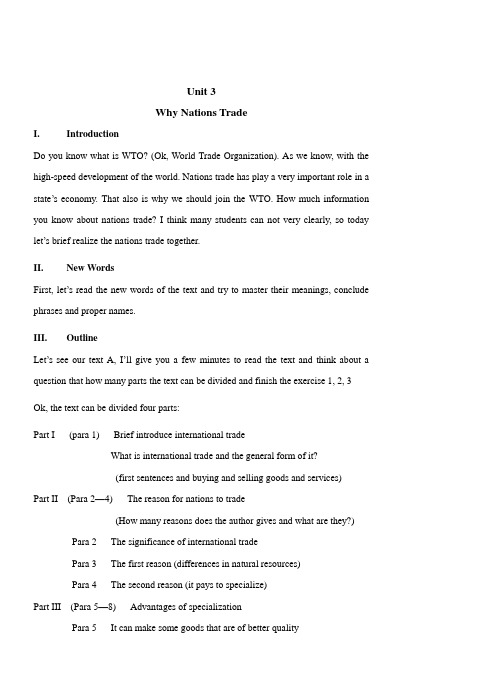
Unit 3Why Nations TradeI.IntroductionDo you know what is WTO? (Ok, World Trade Organization). As we know, with the high-speed development of the world. Nations trade has play a very important role in a state’s economy. That also is why we should join the WTO. How much information you know about nations trade? I think many students can not very clearly, so today let’s brief realize the nations trade together.II.New WordsFirst, let’s read the new words of the text and try to master their meanings, conclude phrases and proper names.III.OutlineLet’s see our text A, I’ll give you a few minutes to read the text and think about a question that how many parts the text can be divided and finish the exercise 1, 2, 3 Ok, the text can be divided four parts:Part I (para 1) Brief introduce international tradeWhat is international trade and the general form of it?(first sentences and buying and selling goods and services)Part II (Para 2—4) The reason for nations to trade(How many reasons does the author gives and what are they?) Para 2 The significance of international tradePara 3 The first reason (differences in natural resources)Para 4 The second reason (it pays to specialize)Part III (Para 5—8) Advantages of specializationPara 5 It can make some goods that are of better quality( the first advantage, example)Para 6 It also enables one country to produce some goods more cheaply( the second advantage, example)Para 7 Comparative advantage (what is it?)Para 8 Give the example for comparative advantage and the third advantage of specialization: it may also help towns, countries andpeople are better off.Part IV (Para 9—10) Primary products are of great importance to many countries Para 9 What is primary products?Para 10 Give the examples for importance of primary productsNow, let analyze these paragraphs one by onenguage points1.exchange: exchange A for B & exchange sth with sb both mean give or receivesth/sb in place of anotherHe exchanged the blue coat for a red one.Ali exchanged seats with Ben.2.in most cases:―case‖ refers to instance or example of the occurrence of sth1)in any case: whatever happens or may have happened无论如何,总之We have to pass your house in any case, so we’ll take your home.2)in case: because of the possibility of sth happening以防万一, 万一It may rain – you’d better take an umbrella (just) in case (it does).3)in case of sth: if sth happens假如In case of fire, ring the alarm bell.4)in no case: in no circumstances无论如何都不5)in that case: if that is the state of affairs假如是那样的话You don’t like your job? In that case why don’t you leave?3.(or) Rather: used to introduce a more precise expressionI worked as a secretary, or rather, a typist.He had to walk—or rather run—to the office4.That is ( to say): to be specificShe is a housewife.He is a local government administrator, that is to say a Civil Servant.5.specialize: give particular attention to (a subject, product,etc); be known forThis shop specializes in chocolates.6.hand in hand: 1) holding each other’s hand 手拉手2) closely associated; linked togetherWar and suffering go hand in hand.7.enable: make sb able to do sth by giving him the necessary authority or means使某人能够做某时This pass enables me to travel half-price on trains.A rabbit’s large ears enable it to hear the slightest sound.8.resource: often used in plural form to mean supply of raw materials etc whichbring a country, person wealthrich in (natural, mineral, agricultural) resources9.one another: each of two or more reciprocally; each other 互相,彼此,相互的We help one another with the extra work in the summer listening to one another’s records.10.it (形主)pays to do sth(动词不定式): doing sth will bring a good result oradvantage to do sth else.11. make use of : to use sth that is available in order to achieve something else or getan advantage for yourself.Not enough people are making use of the children’s play scheme.12. manufacture: make (goods) on a large scale using machinerymanufacturing industriesmanufacture cookers; shoes etc13. be skill at/in doing sth: ability to do sth well 技能,技巧,技艺She’s skilled at dealing with members of the public.14. at home: home here refers to in one’s own countryhome industries; home news;Newspapers both at home and abroad ignored the incident.15. even if/though: in spite of the fact or belief that; no matter (used as conjunctive)whatever 即使, 尽管Even if I have to walk all the way I’ll get there.I like her even though she can be annoying.16. efficiently: adv get industry running more efficientlyefficient: producing a satisfactory result without wasting time or energyan efficient new filing systemeffective: having an effect. Eg. The law is no longer effective.They are similar in form.17. suppose: pretend that sth is true; take sth as a factSuppose you had a million pounds – How would you spend it?Suppose the news is true: what is then?18. below—average: below the standard or level which is considered to usualThe quality of candidates was below average.19. devote…to: give (one’s time, energy) to sb/sth; dedicateThe Cabinet minister left government to devote more time to his young family.She has devoted all her energies to taking care of homeless people.20. talent: special or very great abilityHer talents are well known.She is a young dancer of great talents.21. possess: to have or ownThey possess property all over the world.22. suffer from/with/for sth: feel pain, discomfort, great sorrowShe is suffering from loss of memory.He suffers terribly with his feet.Do you suffer from headache?23.synonym: benefit: sth that gives you advantages or improves your life in some wayprofit: financial gainI have had the benefit of a good education.There’s no profit in running a cinema in this town.24. compared to/with: be compared with 和某事,人相比London is large compare to Paris.Compared to many others you are very lucky.25. be better off: to be in a better conditionWe are better off this year than we were last year.You could pay it back afterwards when you are better off.26. specialize in sth: 1) be or become a specialist2) be well-known forHe specializes in oriental history.This shop specializes in humbergh.27. be made from: to be made out ofWine is made from grapes.Bread is made from corn.The table is made of wood.When the result no longer looks like the original material, we use ―from‖.28. depend on: be supported by; rely onChildren depend on their parents.The country depends heavily on foreign aid.29. happen to sth: be the experience or fate of sth 成为某物体验或命运;临到某物头上If anything happens to him, let me know.What’s happened to my clothes?30. in trouble: in a situation that involves danger, punishment, pain,worry.If we can’t keep to the schedule, we’ll be in trouble.I’m in trouble with the police over drugs.31. count on sth: rely on sth with confidenceDon’t count on a salary increase this year.You don’t count on the weather being fine.32. not…until: until 用在否定句表示“在...以前”“不到...不”;谓语动词为终止性动词译为“直到...才”;为延续性动词译为“直到...为止”He didn’t go until I arrived there.He didn’t wait until I arrived there.V.SummaryThat’s all for the text mainly talked about international trade can be regarded as a form of buying and selling goods and services among different countries. There are two reasons for nations to trade: the differences in natural resources in different countries and the benefit of specialization. When a country specializes, it can benefit in three ways. 1) Products it makes will have a better quality. 2) The cost of these products will be lower. 3) Most important of all, the people in these countries will enjoy a wealthier life. Countries can specialize not only by producing certain goods but also by sellingprimary products, which can be a very important source of income for many countries. Do exercises P45—48Exercise 9 不定代词Some:1)通常用于表示不定数或不定量,修饰复形可数名词或不可数名词,意味“几个”“一些”He asked me some questions.2)用于修饰单形可数名词, 意谓“某个”Some boy had written a Latin word on the blackboard.3)一般用于肯定句Some people are early risers.如果句中包含some的部分具有肯定意义,那么也可用于否定或疑问句.I couldn’t answer some of his question.含有some的疑问句大多表示“请求”或“建议”希望回答yesWill you get me some matches?用于修饰数词表示“大约”It happened some twenty years ago.Any:1.与some 一样, any 也表示不定数或不定量, 修饰复形可数或不可数名词, 意谓“一些”“什么”常用于否定句Are there any stamps in the drawer?2 常用于否定句或从句中,常与never without seldom hardly等连用He never had any luck.3.用于由if or whether引导的宾语从句Let me know if you hear any news.用于条件从句If you have any news, call me up right away.4.用于肯定句,意谓“任何”修饰单形可数和不可数名词Come any day you like.5.用作名词时, 还可后跟of短语, of 之后用复形可数名词或代词I don’t expect to see any of them at the concert.6.用于固定习语中any number of 许多at any rate 不管怎样one: 名词时复数ones1.相当于名词, 泛指“人们”“一个人”“任何人”,无修饰词语One would think I had agreed to her going.2.相当于名词,指“一个人”He is not one to be easily frightened.3.还可跟ofRoy is one of the finest jazz pianists I have ever heard.4. 用作支撑词, 即代替前面刚提到过的名词, 以免重复. 仅用于可数名词, 复数用ones.I haven’t a pen. Can you lend me one?I prefer red roses to white ones.Text B Stocks and SharesQuestions: What is capital?How many kinds of shares? What are they?What is dividends & gilt-edged?Exercise 6 倍数….times as…as表示三以上的倍数用times, 但表示两倍则用twice.Reading Skills: Guessing Unknown WordsGuessing unknown words meaning ask you understanding word formation. Today, we mainly learn about word affix refers to prefix and suffix.Prefix: placed in front of a word to add to or change the meaning of that word. Translation Skills: 转译词类英语名词可转译成汉语的动词|、形容词或副词1.含有动作意味的名词(在记叙、描写文体中出现较多)往往可以转译成动词The sight and sound of our jet planes filled me with special longing.看到我们的喷气式飞机,听见隆隆的机声,令我特别神往。
实用英语第一册课件

美心英语 上海交通大学出版社
Focus 1 Section I
Intensive Reading Unconditional Love
新编实用英语基础教程第1册英语一电子教(学)案
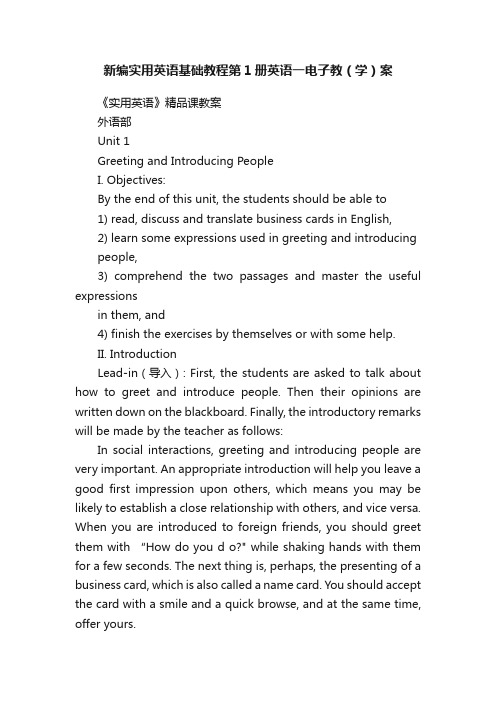
新编实用英语基础教程第1册英语一电子教(学)案《实用英语》精品课教案外语部Unit 1Greeting and Introducing PeopleI. Objectives:By the end of this unit, the students should be able to1) read, discuss and translate business cards in English,2) learn some expressions used in greeting and introducingpeople,3) comprehend the two passages and master the useful expressionsin them, and4) finish the exercises by themselves or with some help.II. IntroductionLead-in(导入): First, the students are asked to talk about how to greet and introduce people. Then their opinions are written down on the blackboard. Finally, the introductory remarks will be made by the teacher as follows:In social interactions, greeting and introducing people are very important. An appropriate introduction will help you leave a good first impression upon others, which means you may be likely to establish a close relationship with others, and vice versa. When you are introduced to foreign friends, you should greet them with “How do you d o?" while shaking hands with them for a few seconds. The next thing is, perhaps, the presenting of a business card, which is also called a name card. You should accept the card with a smile and a quick browse, and at the same time, offer yours.I. Objectives:By the end of this unit, the students should be able to1) read, discuss and translate announcements,2) learn some expressions used in ask for and give names3) comprehend the two passages and master the useful expressionsin them, and4) finish the exercises by themselves or with some help.II. Introduction1. How to greet in China?How do people greet each other in China?Chinese traditional etiquette:bow to each other or bow with your left hand holding the right hand and raising them above your chest. Modern manners: shake hands or wave.2. How do people greet each other in other different countries?In Thailand, people greet each other by putting their hands together and bowing slightly.In South America, you expect to be huggedIn the Middle East, when you meet someone, Arabs greet each other by touching noses.In the USA, people shake hands when meeting each other.In France, Britain, Finland, China…, it is the custom to shake hands with people at the first time.Dutch荷兰的; kiss吻; cheek脸颊When Dutch people meet, they kiss each other on the cheek, especially for the close friends.In Japan, people bow to each other when they meet.3. Discussion:What about a Chinese and a Japanese meeting for the firsttime? Tips: Do in Rome as the Romans do.4. ExpressionsFormal:1. How do you do?2. How are you (doing)?3. Nice to meet you.4. Long time no see.5. How are you getting along with...?6. How is everything?7. How is your vacation/ holiday(s)/ Christmas Day/weekend? Informal:What's up?Hello? /Hi?What's going on?How is life?How is it going? anything new?Pleased to meet you again!III. Teaching Procedures:Section I. Talking Face to FaceStep 1. Presentation: Read the following Samples of business cards Business cards are very useful for introducing people. Now let's read the following business cards.。
实用英语第一册电子教案
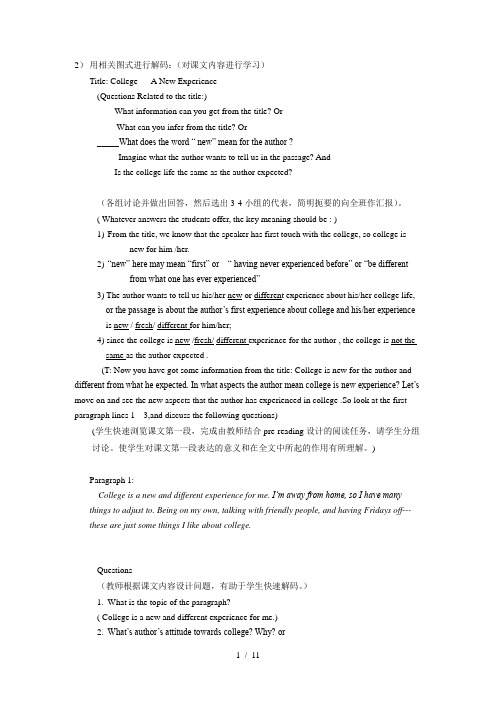
2)用相关图式进行解码:(对课文内容进行学习)Title: College---- A New Experience(Questions Related to the title:)____What information can you get from the title? Or____ What can you infer from the title? Or_____What does the word “ new” mean for the author ?____Imagine what the author wants to tell us in the passage? And____Is the college life the same as the author expected?(各组讨论并做出回答,然后选出3-4小组的代表,简明扼要的向全班作汇报)。
( Whatever answers the students offer, the key meaning should be : )1)From the title, we know that the speaker has first touch with the college, so college isnew for him /her.2)“new” here may mean “first” or “ having never experienced before” or “be differentfrom what one has ever experienced”3) The author wants to tell us his/her new or different experience about his/her college life,or the passage is about the author’s first experience about college and his/her experienceis new / fresh/ different for him/her;4) since the college is new /fresh/ different experience for the author , the college is not thesame as the author expected .(T: Now you have got some information from the title: College is new for the author and different from what he expected. In what aspects the author mean college is new experience? Let’s move on and see the new aspects that the author has experienced in college .So look at the first paragraph lines 1---3,and discuss the following questions)(学生快速浏览课文第一段,完成由教师结合pre-reading设计的阅读任务,请学生分组讨论。
实用英语综合教程第一册第一单元
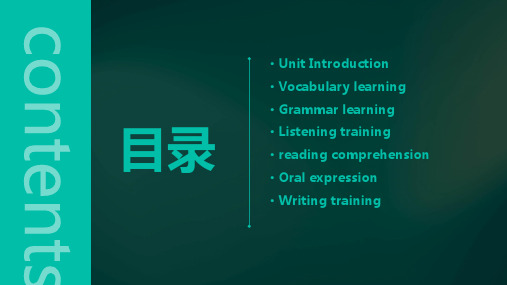
05 reading comprehension
Reading materials
选择合适的阅读材料
选择适合学习者水平的文章,可以是新闻报道、短篇小说、 科普文章等。确保文章内容有趣、相关,能够吸引读者的 注意力。
材料的难度
根据学习者的实际英语水平,选择难度适中的阅读材料。 难度过高的文章可能会使学习者感到挫败,而过于简单的 文章则可能无法提供足够的挑战。
01 Unit Introduction
Unit objectives
Language Skills
To improve English language skills, including reading, writing, speaking, and listening.
Communication Skills
02 Vocabulary learningΒιβλιοθήκη New vocabulary
01 02
Listening practice
The student should listen to the audio recording of the new vocabulary and repeat after the speaker. This helps to improve pronunciation and listening comprehension.
Matching
The student should match the correct vocabulary words with their corresponding meanings or synonyms/antonyms.
Vocabulary extension
实用英语1unit1 section 1

Back
Following Sample Dialogues
Imitate and Perform 4 Read the following sample dialogues and try to perform your own tasks. 1) Meeting People for the First Time Lu Yang: Hello, nice to meet you. My name is Lu Yang. Michael: How do you do, Professor Lu? I'm Michael Breen. Please call me Mike. Lu Yang: Welcome to our department, Mike. Michael: Thank you. Here's my card. Lu Yang: Thanks. So you are here for the research project? Michael: Yes, I am. Jack: Excuse me, are you Mr. Li Tiegang? Li Tiegang: Yes, I am. Jack: How do you do, Mr. Li? I'm Jack Green from Zhonghua Technical School. Li Tiegang: Nice to meet you, Mr. Green. Welcome to our company. Jack: Thank you. Here is my business card. Li Tiegang: Thanks. This ve and say goodbye to your hostess, Mrs. Waters.
- 1、下载文档前请自行甄别文档内容的完整性,平台不提供额外的编辑、内容补充、找答案等附加服务。
- 2、"仅部分预览"的文档,不可在线预览部分如存在完整性等问题,可反馈申请退款(可完整预览的文档不适用该条件!)。
- 3、如文档侵犯您的权益,请联系客服反馈,我们会尽快为您处理(人工客服工作时间:9:00-18:30)。
A ☆ Asks B if he has plan tomorrow
night. ☆ Invites B to have dinner. ☆ Set the time to meet. ☆ Show agreement. ☆ Make a decision.
B ☆ Watch TV. ☆ Accepts the invitation. ☆ Shows agreement, asks A if he
简明实用英语高职高专 ppt 课件
Task 4 Directions: In this part you will hear 5 recorded
conversations. After each conversation there is a question. Both the conversations and questions will be read twice. Listen carefully and choose the best answer.
简明实用英语高职高专 ppt 课件
Unit Three Western Holidays
Section Ⅰ Listening and Speaking Section Ⅱ Intensive Reading Section Ⅲ Grammar Section Ⅳ Applied Writing Section Ⅴ Reading Practice Section Ⅵ Cultural Tips
简明实用英语高职高专 ppt 课件
Speak Out
Task 1 Listen and Repeat Directions: Listen carefully and complete the
conversation orally by responding to what you have heard on the tape.
write down your answer in no more than 3 words.
Key Words acquaintance /ə'kweintəns/ n. 熟人, 相识 specialty /'speʃəlti/ n. 专门,特别,特色 pumpkin /'件
Task 2 Role-play
Directions: Create a dialogue with a partner for the following situation. Role-play the dialogue in front of the next class.
Preview
The Thanksgiving holiday celebrated each November in the United States is known worldwide as an American custom. And Thanksgiving and gratitude have marked important milestones in American life for hundreds of years.
简明实用英语高职高专 ppt 课件
Task 2 Directions: In this part you will hear a dialogue
twice. Listen carefully and fill in the blanks.
简明实用英语高职高专 ppt 课件
Task 3 Directions: Listen to a dialogue three times and
简明实用英语高职高专 ppt 课件
Task 2 Directions: In this part you will hear 10
sentences twice. Listen carefully and fill in the blanks.
简明实用英语高职高专 ppt 课件
Listen On
would bring someone else. ☆ Asks A if he would bring some wine
to the diner. ☆ Thanks A for the invitation.
Section Ⅱ Intensive Reading The History of Thanksgiving Day
简明实用英语高职高专 ppt 课件
Section Ⅰ Listening and Speaking Invitation
Tune In
Task 1 Directions: You will hear one word read from
each group. Underline the letter beside the word you hear.
Task 1 Warming Up — Patterns Learning
1. I was wondering if you have the time to join us. 2. What about the day after tomorrow? 3. What are you doing this weekend, Ken? 4. Sounds good. And thank you for your invitation. 5. That’s fine. I think I can make it. 6. I think it’ll be all right. When should we meet, then? 7. Let’s meet at nine o’clock at the school gate. 8. Sorry. I can’t make it this time.
Text
The History of Thanksgiving Day
Thanksgiving Day is the most truly American of the national Holidays in the United States and is most closely connected with the earliest history of the country. The story of Thanksgiving is basically the story of the Pilgrims and their thankful community feast at Plymouth, Massachusetts.
